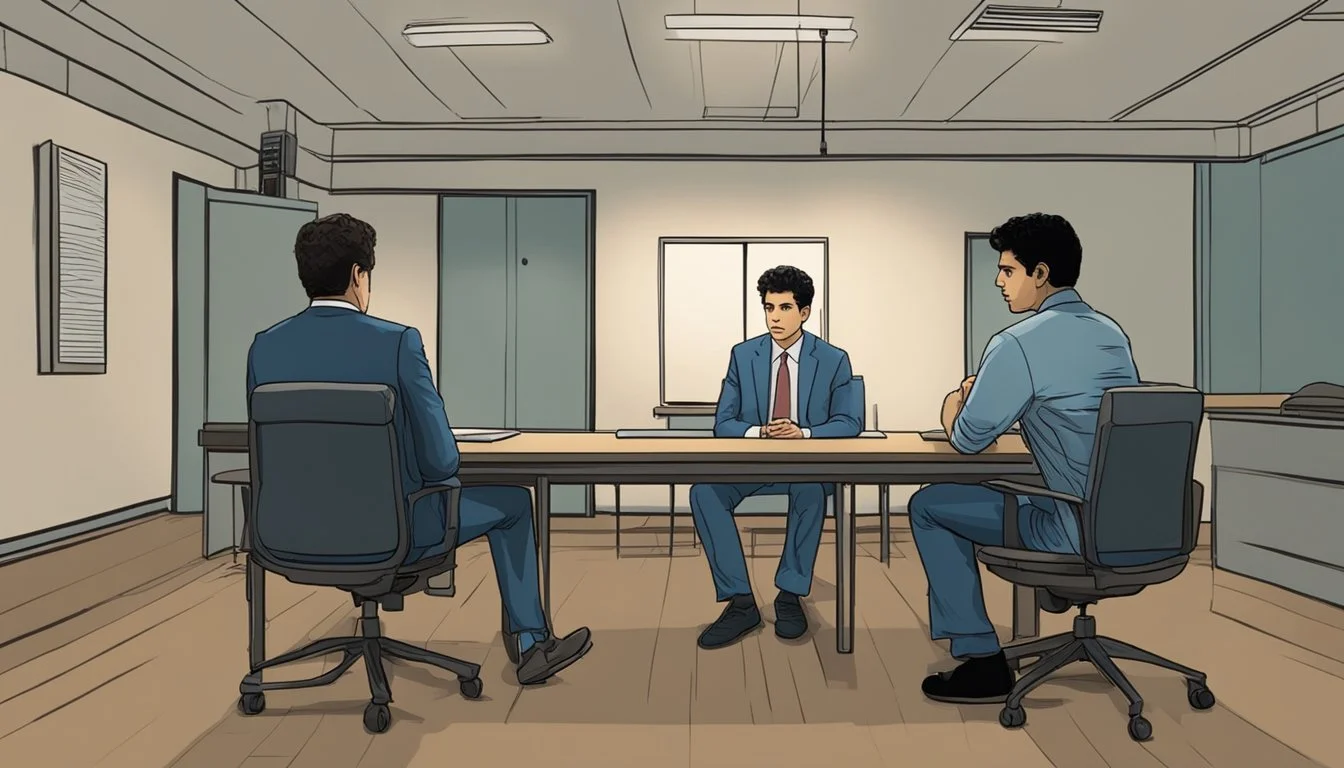Ethics of Prison Interviews: Filming the Menendez Brothers Behind Bars
Balancing Media Access and Inmate Rights
Prison interviews with high-profile inmates like the Menendez brothers raise complex ethical questions about media access and public interest. Recent documentary filmmakers have gained unprecedented access to Lyle and Erik Menendez, convicted of murdering their parents in 1989. These interviews provide new insights into the infamous case and the brothers' perspectives after decades behind bars.
Filming inmates presents unique challenges around consent, exploitation, and the potential to glorify violent crimes. Supporters argue these interviews serve an educational purpose and allow prisoners to share their stories. Critics contend they may retraumatize victims' families or provide undue attention to convicted killers.
The Menendez brothers' case continues to captivate the public over 30 years later. Their recent on-camera appearances have reignited debates about their guilt and the fairness of their life sentences. As filmmakers and journalists pursue access to high-profile prisoners, the ethics of such interviews remain a contentious issue in criminal justice and media circles.
Contextual Background of the Menendez Brothers
The Menendez brothers' case captivated public attention due to its shocking nature and complex family dynamics. Their story involves privilege, alleged abuse, and a brutal crime that forever altered their lives.
Early Life and Family Dynamics
Lyle and Erik Menendez grew up in an affluent household in Beverly Hills. Their father, Jose Menendez, was a successful entertainment executive, while their mother, Kitty, was a homemaker.
The family projected an image of wealth and success to the outside world. However, beneath the surface, tensions simmered.
Both brothers later claimed they suffered years of physical, emotional, and sexual abuse at the hands of their parents. This alleged abuse became a central element of their defense strategy during the trial.
The Menendez family's public facade contrasted sharply with the private struggles they reportedly faced. This dichotomy between appearance and reality would later become a focal point of media coverage and public fascination.
The 1989 Beverly Hills Murders
On August 20, 1989, Jose and Kitty Menendez were shot multiple times in their Beverly Hills mansion. The brutality of the crime shocked the community.
Initially, Lyle and Erik were not considered suspects. They claimed to have been at a movie theater during the time of the murders.
Suspicions arose when the brothers began spending large sums of money in the weeks following their parents' deaths. This extravagant behavior raised eyebrows and led investigators to take a closer look at their potential involvement.
Months later, Erik confessed to his therapist. This confession, along with other evidence, led to the arrest of both brothers in March 1990.
The case quickly gained national attention, fueled by the combination of wealth, family secrets, and the shocking nature of the crime.
Criminal Proceedings and Outcomes
The Menendez brothers' case involved complex legal proceedings and resulted in life sentences for both Erik and Lyle. Recent developments have raised questions about potential changes to their incarceration status.
Trials and Conviction
The Menendez brothers faced two trials for the murder of their parents. The first trial in 1993 ended in hung juries for both brothers. In 1995, a second trial began with Los Angeles County District Attorney Gil Garcetti prosecuting the case.
Prosecutor Pamela Bozanich argued against the brothers' claims of self-defense. The prosecution presented evidence of premeditation and financial motives. After a lengthy trial, the jury found Erik and Lyle Menendez guilty of first-degree murder.
In 1996, Judge Stanley Weisberg sentenced both brothers to life in prison without the possibility of parole. The conviction marked the end of a high-profile case that had captured national attention.
New Evidence and Possibility of Parole
In recent years, discussions about new evidence and potential parole have emerged. Supporters of the Menendez brothers argue that childhood abuse should be considered as a mitigating factor.
Some legal experts suggest that changes in California law regarding youthful offenders could impact the case. These laws allow for parole hearings for individuals who committed crimes as minors.
However, any changes to the brothers' sentences would require significant legal hurdles. The Los Angeles County District Attorney's office has historically opposed efforts to reconsider the case.
As of 2024, Erik and Lyle Menendez remain incarcerated with no immediate prospect of release. The debate surrounding their case continues to evolve, reflecting changing perspectives on criminal justice and rehabilitation.
Public and Media Perception
The Menendez brothers case captivated the public and shaped media narratives. Intense coverage and evolving public opinions played a significant role in the trial proceedings and cultural discourse surrounding the murders.
The Influence of Media Coverage
Media portrayals of the Menendez brothers fluctuated over time. Initially, news outlets focused on the shocking nature of the crime and the brothers' lavish lifestyle in their Beverly Hills mansion.
As details emerged about alleged childhood abuse, some media narratives shifted. Coverage began exploring the complex family dynamics and potential motivations behind the murders.
Television interviews and courtroom broadcasts brought the case into living rooms across America. This unprecedented access allowed viewers to form their own opinions about the brothers' guilt or innocence.
Public Reaction and Juror Impressions
Public opinion on the Menendez case was divided. Some viewed the brothers as cold-blooded killers motivated by greed. Others sympathized with their claims of abuse and saw them as victims.
Jurors faced the challenge of separating media narratives from courtroom evidence. The prosecution emphasized physical evidence like gunpowder residue, while the defense focused on emotional testimony about childhood trauma.
Social media has reignited interest in the case, with new generations reexamining the evidence and circumstances. Documentaries and online discussions continue to shape public perceptions of the Menendez brothers and their actions.
Documentary and True Crime Narratives
Prison interviews with notorious criminals have become a staple of true crime documentaries. The Menendez brothers case continues to captivate audiences through various film and television productions.
Filming the Menendez Brothers in Prison
Netflix released a documentary featuring interviews with Lyle and Erik Menendez from behind bars. The brothers spoke with filmmaker Alejandro Hartmann about their infamous case. They discussed their upbringing, trial, and offered new perspectives on the events of August 20, 1989.
Prison interviews present unique challenges for filmmakers. Security protocols and restricted access can limit production options. Despite these constraints, the Menendez brothers' prison conversations provided compelling content for the documentary.
Impact of 'Menendez: Blood Brothers'
The Lifetime movie 'Menendez: Blood Brothers' brought renewed attention to the case. Directed by Fenton Bailey and Randy Barbato, the film dramatized the brothers' story for a new generation of viewers.
This production sparked discussions about the ethics of dramatizing real-life crimes. It raised questions about the balance between entertainment and respectful portrayal of victims. The film's release coincided with increased public interest in the Menendez case.
True Crime Genre and Audience Engagement
True crime content has surged in popularity across streaming platforms. The Menendez brothers' story has been featured in multiple documentaries and series. These productions often blend archival footage with new interviews and dramatic reenactments.
Social media has amplified audience engagement with true crime narratives. Viewers discuss theories, share opinions, and debate case details online. This interaction has led to renewed interest in older cases like the Menendez murders.
Ethical concerns arise regarding the impact of true crime content on victims' families and public perceptions of the justice system. Producers face the challenge of balancing entertainment value with responsible reporting.
Legal and Ethical Perspectives
Prison interviews with high-profile inmates like the Menendez brothers raise complex legal and ethical questions. These interactions can impact rehabilitation efforts and the integrity of the justice system.
The Question of Rehabilitation
Prison interviews may offer inmates like Erik and Lyle Menendez opportunities for reflection and personal growth. Some argue these conversations could aid rehabilitation by allowing offenders to process their crimes. Critics contend that media attention could hinder genuine reform efforts.
Rehabilitation programs in prisons aim to reduce recidivism and prepare inmates for eventual release. For those serving life sentences, like the Menendez brothers, the focus shifts to personal development and coming to terms with their actions.
The brothers' claims of childhood sexual abuse add another layer to rehabilitation discussions. Treatment approaches may need to address both their trauma and their violent actions.
Ethical Implications of Interviews and Confessions
Prison interviews can provide valuable insights into high-profile cases. However, they also risk sensationalizing crimes or re-traumatizing victims' families. Ethical journalists must balance public interest with sensitivity to those affected by the crimes.
The Menendez brothers' televised confessions during their trial raised questions about self-incrimination and media influence on legal proceedings. These concerns persist in modern prison interviews.
Prosecutors argue that post-conviction interviews could reveal new information relevant to potential resentencing efforts. Defense attorneys may caution clients against making statements that could impact future legal strategies.
Ethical considerations extend to the portrayal of inmates in documentaries like "Monsters: The Lyle and Erik Menendez Story." Filmmakers must navigate the fine line between informative storytelling and exploitation.
Cultural Impact and Ongoing Discourse
The Menendez brothers case continues to shape public discourse on criminal justice and abuse. Its influence extends beyond true crime circles into broader social movements and celebrity advocacy.
Influence on the #MeToo Movement
The Menendez case has gained new relevance in light of the #MeToo movement. Allegations of sexual abuse by Jose Menendez have prompted reevaluation of the brothers' motives. This has sparked debates on how society views male victims of sexual abuse.
Some advocates argue that the case highlights the long-term impacts of childhood trauma. The brothers' claims of abuse, once dismissed, are now being reexamined through a more empathetic lens.
Celebrity Advocacy and Public Interest Cases
High-profile figures have taken up the Menendez brothers' cause. Kim Kardashian, known for her criminal justice reform efforts, has shown interest in the case. Her involvement has brought renewed attention to the brothers' life sentences.
Los Angeles County District Attorney George Gascón faces pressure to review the case. Celebrity advocacy has amplified calls for sentence reconsideration. This has led to discussions about the role of public figures in shaping legal outcomes.
Audio interviews with the brothers from prison have fueled public curiosity. These recordings offer insights into their current perspectives and life behind bars. The media's continued interest reflects the case's enduring grip on public imagination.
Reflections on Justice and Incarceration
The Menendez brothers' case raises complex questions about justice, punishment, and rehabilitation. Their life sentences without parole have sparked debates on proportionality and the possibility of redemption.
Analyzing the Life Sentences
Lyle and Erik Menendez received life sentences without the possibility of parole for murdering their parents in 1989. This harsh punishment reflects the severity of their crime. Critics argue that life sentences without parole are essentially a "death by incarceration" and may be disproportionate, especially for crimes committed by young offenders.
Proponents of the sentences point to the premeditated nature of the murders and the brothers' apparent lack of remorse during the trial. The case highlights ongoing debates about retributive versus rehabilitative approaches to justice.
Incarceration and the Prospect of Resentencing
The Menendez brothers have spent over three decades behind bars at Richard J. Donovan Correctional Facility in California. Their incarceration has been marked by adaptation and legal battles. Recent developments in criminal justice reform have opened discussions about potential resentencing.
Los Angeles District Attorney George Gascón's policies on juvenile offenders and life sentences have sparked interest in the case. Gascón's approach emphasizes rehabilitation and second chances, even for serious crimes.
Legal expert Alan Abrahamson notes that any resentencing would face significant hurdles, given the notoriety of the case and the brothers' current ages. The prospect remains slim but highlights evolving views on justice and incarceration.








